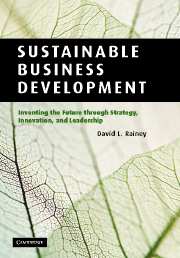Book contents
- Frontmatter
- Contents
- List of figures
- List of tables
- List of boxes
- List of abbreviations
- Acknowledgments
- Introduction
- Part I Enterprise thinking, the driving forces of change, and leadership
- Part II Innovation management, life cycle considerations, and insights
- Glossary
- Select bibliography
- Index
- References
Introduction
Published online by Cambridge University Press: 04 December 2009
- Frontmatter
- Contents
- List of figures
- List of tables
- List of boxes
- List of abbreviations
- Acknowledgments
- Introduction
- Part I Enterprise thinking, the driving forces of change, and leadership
- Part II Innovation management, life cycle considerations, and insights
- Glossary
- Select bibliography
- Index
- References
Summary
The coming of age of sustainable business development
At the dawn of the twenty-first century, sustainable business development (SBD) is coming of age. Leading global corporations are embracing SBD as a strategic framework for integrating their business enterprises, creating innovative solutions to the complex needs and requirements of the business environment, and thinking strategically about leading change. SBD takes a comprehensive perspective of the corporation and its business environment that includes direct relationships with suppliers, distributors, customers, partners, employees, and shareholders and indirect linkages with stakeholders, competitors, related industries, and the natural environment (the eco-systems).
SBD may be perceived as a subset of the broader concepts of sustainability and sustainable development as defined by the international community of nations and the United Nations. Sustainable development involves articulating, integrating, and achieving social, economic, and environmental objectives and initiatives to protect humankind and the natural world. The formal legal underpinnings of sustainable development were developed during the United Nations Conference on Environment and Development at the Rio Earth Summit in June 1992. At the Rio Earth Summit, Agenda 21: Earth's Action Plan was prepared and presented as “a set of integrated strategies and detailed programs to halt and reverse the effects of environmental degradation and to promote environmentally sound and sustainable development in all countries.” The Rio Conference and the subsequent World Summit on Sustainable Development in Johannesburg in August 2002 laid out the principles and proposed action plans but did not reach consensus on how to implement the initiatives.
- Type
- Chapter
- Information
- Sustainable Business DevelopmentInventing the Future Through Strategy, Innovation, and Leadership, pp. 1 - 8Publisher: Cambridge University PressPrint publication year: 2006



